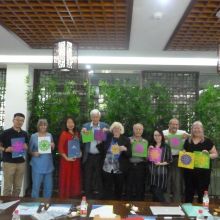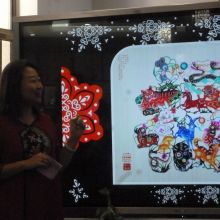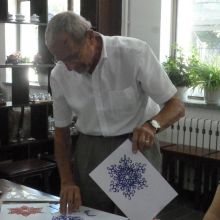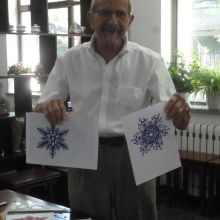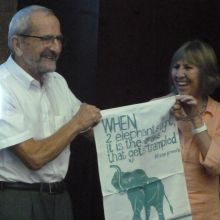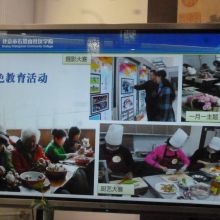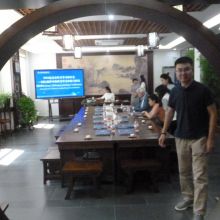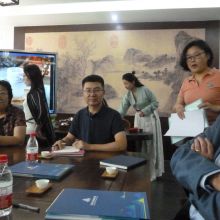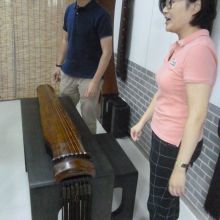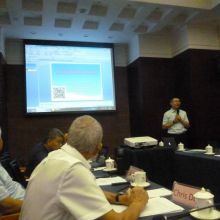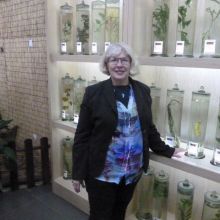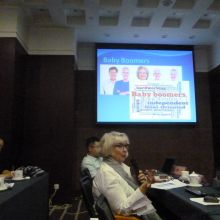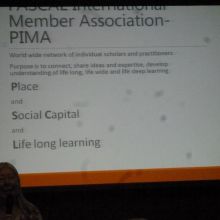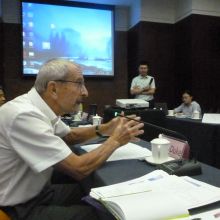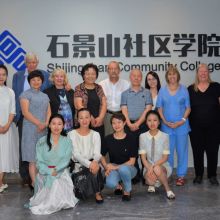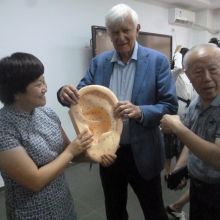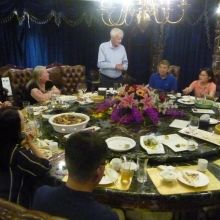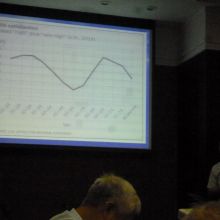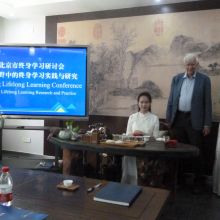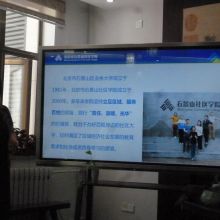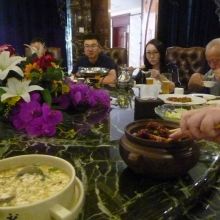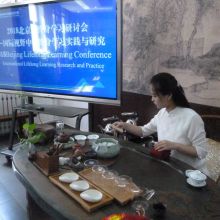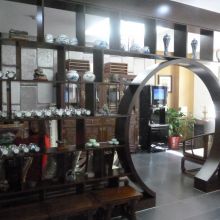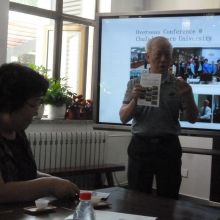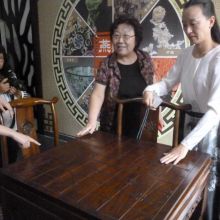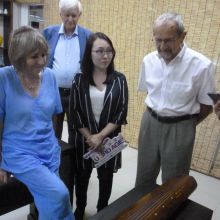A report on the PIMA International Seminar on Lifelong Learning, Beijing, China, 3-4 September 2018
This 2-day seminar (3-4 September 2018), was planned and carried out by the PASCAL International Membership Association (PIMA). It was hosted and partnered by the Institute for Lifelong Learning and Sustainable Development (Beijing Academy of Educational Sciences [BAES]) and the Beijing Adult Education Association.
Field Trip – 3 September
Our first day welcome began with a programme at the Beijing Shijingshan Community College in their traditional tea culture classroom. After introductions from the President and Deputy Head we focussed on work in the area of elder education. Overall, the College provides degrees, skill training and elders’ learning activities (as part of their Elderly University component and entity).
Available to seniors specifically are the Spare/Part-time University, Workers Service Courses, Community Education and Enrichment Classes in traditional performance and crafts, cooking, to Chinese medicine. These programmes have been running for twenty years since the inception of a modern College, with exceptional facilities.
Apart from utilising three campuses, we also learnt of informal courses designed for citizens in their neighbourhoods, which are part of the College’s vision: a “University inside the Community”.
There are 236 curriculum options through the College campuses and nine different community branches. Within their neighbourhoods and local self-learning groups alone, studies are undertaken by 7,000 students. Senior graduands even wear academic dress at their achievement awards.
One of their 80-year old students took her presentation at the College’s learning result exhibition to win a national speech competition on “My Learning Story”. The College also hosts a Lifelong Learning Festival. Before leaving the College, our experiential lesson was guided for a ‘Chinese paper cutting’ exercise – to varying results, but pursued with great vigour and application.
U3A Singapore
Thomas Kuan, the PIMA leader of the Later Life Learning Special Interest Group, and U 3rd Age – Singapore Founder with Carol Kuan (Managing Director), added their NGO work with U3A. Of particular interest was how 3,000 senior citizens have participated in a range of arts & crafts, health, peer and intergenerational learning, work skills, mental wellbeing and train the trainer courses. Intergenerational bonding is achieved through their snakes and ladders “Path to Happiness” game. An online PASCAL EcCoWell2 report will detail.
International Seminar on Lifelong Learning – 4 September
The Director of the Institute for Lifelong Learning and Sustainable Development opened this second Lifelong Learning meeting with welcome remarks on the progression in the construction of Beijing as a learning city with medium and long term goals, through Development 2020. The Mayor of Beijing has actively supported an integrated city and education approach that continues to promote learning capital. Lifelong learning is foreseen as the only way for human (individual), and sustainable, development in entering the era of a learning society with rapid IT, AI, and mobile innovations. Lifelong learning was identified as important internationally, with learning cities promoted by UNESCO. The key in China is in the strategic research of the Institute and the commitment to implementing lifelong learning within a learning oriented society.
Next, New Futures: Working together for lifelong learning in a fast-changing century was the theme of Professor Chris Duke’s address. He reflected on the scale of change within China (e.g. the belt and road initiative) and the enactment of responses to such change determined by government, whereas in the West there is not such immediate or directed transformation. The common ground in sharing worldwide problems (climate change, mega cities, demographic balances, understanding of human nature, over-consumption, etc.) will provide many opportunities to collaborate and achieve win-win solutions. Duke also suggested that the market forces in the West left civil society, NGOs or private enterprise so far, not governments, to forge the 3rd wave of lifelong learning.
The charting of 40 years of Chinese adult education development and reform was provided by the Vice- President of the Beijing Adult Education Association. Although the current reality regarding adult education is impacted by change, the constitution has remained the same in recognising adult education. It is time to look to the future we were advised. Needing more qualified young workers, quality teaching, and the ‘on the job’ training for adults is now using lifelong learning as a prime concept. Many graphs showed the phases of adult education development and participation against GDP, with the term ‘learning society’ being introduced since 2009. A ten year plan has two more years to maximise the Communist Party’s intention to become a strong country with human resources that achieve a learning society. As a consequence, the concept of Learning Cities officially began and a Lifelong Learning Festival Week was introduced. Greater encouragement for institutions to have learning for senior citizens and training in multi-technologies needs to be part of policy. More power in the ‘second leg’ (i.e. adult education) is a warranted innovation.
PASCAL Board member Peter Kearns focussed on the subject of Towards a Paradigm for Learning in Later Life: In the context of ageing populations. The cascade approach to lifelong learning from government, through administrative districts to neighbourhoods/street level provided for inclusion, as a basic objective. This was described as impressive in Chinese learning cities. While the WHO model for active ageing can help achieve community building, the original three pillars ‘need more’ when the OECD advises an employment age advancing to 72, with the issues around unhappiness and loneliness, and the concerns facing this planet. Kearns conceived five pillars so as we move into later life, we can participate in a holistic cycle of lifelong learning. In searching for a more ethical and moral framework, the ancient Chinese metaphysical BaZi approach was matched to the five pillars of Participation, Inclusion, Citizenship/Fulfilment, Security and Health/Happiness/Employability; i.e. Outputs, Aims/Resources, Needs/Authority, Inclusion and Self-Wealth.
Lifelong, Life-wide and Life-deep Learning was explained by Professor Shirley Walters through analogies with South Africa’s HIV/AIDS pandemic where families had been decimated by crisis. From a feminist perspective, she affirmed gender balance and justice for all, especially where there is violence and a need for sustainable livelihoods. Strengthening lifelong learning was envisaged as embodying physical and emotional security (life-wide) as well as fulfilment in enjoying life (life-deep). A sense of life value was inherent. Creating inclusion and inter-generational learning were also elemental to the process and plan for lifelong (across the ages), life-wide (meeting socio-economic concerns) and life-deep (personally social and spiritual transformation) learning. Avoiding isolation through community education was proposed as a way towards ‘developing well’. Thinking, acting and understanding to develop a deep consciousness could help people grasp the difficult life-deep concept. A pedagogy of compassion was proposed for building individual and collective resilience.
Dr Reghenzani-Kearns explored options for Enhancing Later Life Learning with ageing baby boomers impacting demographic change. International Longevity Centres (adding Lifelong Learning to the WHO active ageing pillars) and the age-friendly movement adopted by local city governments in Australia and around the world, some valuing community education, have attempted to respond. The wider benefits of lifelong learning were addressed with the better control, efficacy, transitions, sense of purpose, tolerance, health, engagement, family relations to mental wellbeing achieved. Without appropriate, accessible and inclusive learning of personal choice, the converse recognised cognitive decline and loneliness as a result. The PASCAL EcCoWell framework was suggested as a context within which to respond in an integrated manner. Examples of government policy, PASCAL Learning City Networks, cultural/faith bodies, libraries, lifelong learning festivals, and intergenerational learning were recommended to achieve holistic and intersectoral partnerships.
The Development and Current Situation of the Learning City in Beijing was at the essence of the presentation by the Deputy Director of the Beijing’s Research Centre for the Learning City (within BAES). Starting, exploring and promoting harmonious educational reform established a Lifelong Education System, with a goal for Beijing to be a modern, world class metropolis. The aims were to develop human resources, provide special compensatory education, and encompass learning opportunities for employees, peasants, corporates and the community. Meaning and ideology were clarified through research with strategies adopted for city and educational development, and in building an ‘excellent’ learning city. A Learning City Index System was introduced to programme, manage, implement, assess and improve the initiatives. Monitoring the Index drew from the UNESCO features of a learning city. Honours have been awarded for being Beijing’s advanced learning counties/districts, community and enterprise zones, as well as model learning community education centres. Nearly 1,000 people and brands, as well as 81 projects have become ‘superstars’ of learning.
A commentary by PIMA President Dorothy Lucardie, centred on Leadership for Lifelong and Life-wide Learning: Strength through collaboration and networking. The aims of the PASCAL (Place, Social Capital and Lifelong Learning Regions) International Observatory and the ‘friends of PASCAL’, PASCAL International Membership Association (PIMA), were outlined as an example of a supportive partnership. Such an alliance and links to professional bodies and individuals in the PASCAL fields has enabled voluntary networking through meetings and discussions, publications and ongoing communications, shared planning and ideas to scholarly theorising on adult education and lifelong learning across diverse contexts. The outcomes were described through seminars and conferences, shared resources, trans-national and regional projects, global programmes (e.g. the learning city exchanges and themes networks) to advocacy at international, regional, national and local levels. Strengthening each other to achieve shared goals into the future was foreseen as commendable.
In Conclusion
This meeting was a triumph for Dr YUAN Dayong who brought together the two sponsors in support of international and local participation: the Institute for Lifelong Learning and Sustainable Development (Beijing Academy of Educational Sciences [BAES]) and the Beijing Adult Education Association. Without their willing help it would not have been possible. The thorough quality of programming and range of knowledge shared is attributable to Dayong’s planning, as Deputy Director of the Institute for Lifelong Learning and Sustainable Development, and his colleague Dr GUI Min. We thank you for this high-level opportunity to share interests, experiences and achievements for PIMA.
Dr Denise Reghenzani-Kearns: PASCAL Associate and PIMA Member
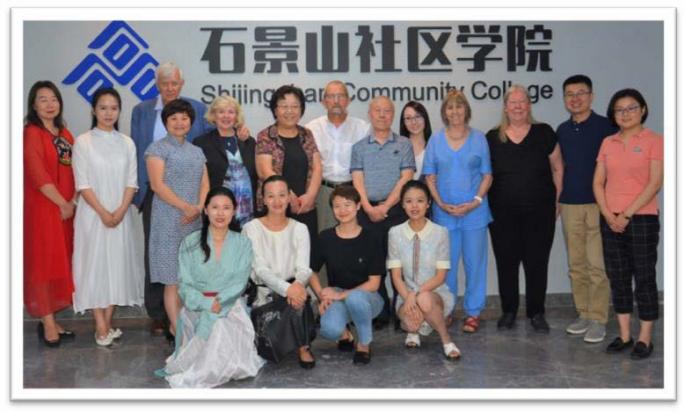
Gallery of photos taken at the PIMA Seminar (click to enlarge)
- PASCAL Activities:
- PASCAL Themes:
 Printer-friendly version
Printer-friendly version- Login to post comments


